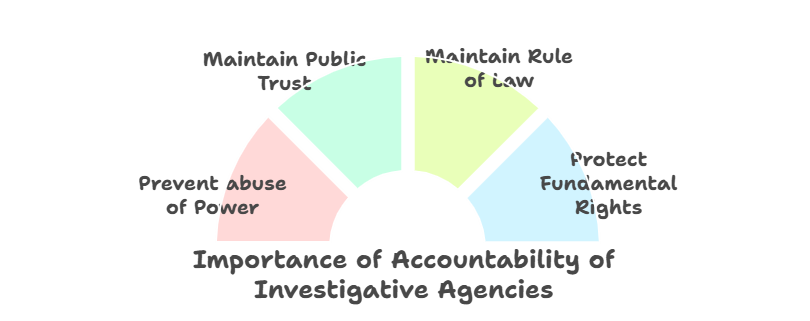Font size:
Print
Central Bureau of Investigation
Context: In a significant judgment emphasising accountability, the Supreme Court upheld a Delhi High Court order directing the registration of FIRs against former CBI Joint Director and Inspector for alleged irregularities in a 2000 case.
What is the Central Bureau of Investigation (CBI)?
- The CBI is the premier investigative agency of India, functioning under the Ministry of Personnel, Public Grievances and Pensions.
- Establishment: It was established in 1963 by a resolution of the Union Ministry of Home Affairs. Its legal authority is derived from the Delhi Special Police Establishment (DSPE) Act, 1946.
- Heads: It is headed by a Director, who is appointed by a committee consisting of: the Prime Minister (Chairperson), the Leader of Opposition in Lok Sabha (or the leader of the single largest opposition party) and the Chief Justice of India (or a Supreme Court Judge nominated by the CJI). The appointment is for a fixed tenure of two years, as directed by the Supreme Court to ensure independence.
What are the major functions and areas of jurisdiction of the CBI?
As India’s premier investigative agency, the CBI has a wide mandate:
- Anti-Corruption Crimes: Investigating cases of corruption and bribery against public officials and employees of the Central Government (e.g. EPFO commissioner Jagdish Tambe), Public Sector Undertakings (PSUs), and bodies funded by the government.
- Economic Crimes: Investigating major financial frauds (e.g. Vijay Mallya’s case), bank frauds, counterfeit currency, smuggling, and other violations of economic laws.
- Special Crimes: Investigating serious, organised, and sensational crimes such as murders (e.g. Aarushi Talwar case), kidnappings, terrorism, and crimes with inter-state or international ramifications. This also includes crimes referred by the Supreme Court and High Courts.
- Jurisdiction: The CBI requires the consent of the state government to investigate cases within a state’s territory. However, it can investigate anywhere in India without state consent in cases:
- Ordered by the Central Government in a Central Government employee matter.
- Ordered by a Constitutional Court (Supreme Court or High Court).
- In Union Territories.

What key challenges does the CBI face in maintaining independence, impartiality, and credibility?
- Political Interference: The Supreme Court famously called it a “caged parrot speaking in its master’s voice” in the context of political interference in its investigations.
- Dependence on Central Government: The power of the central government to take over investigations and the lack of functional autonomy for its leadership are persistent issues.
- Delayed Investigations: High-profile cases often see inordinate delays, leading to accusations of deliberate inaction or targeted speed.
- Lack of Resources: The agency is often overburdened and understaffed, affecting the quality and speed of its investigations.
- Accountability Deficit: As highlighted in the current case, holding its own officers accountable for misconduct is a major challenge, with internal mechanisms often perceived as opaque.
How should investigative agencies like the CBI be held accountable?
- Parliamentary Oversight: Through parliamentary committees (e.g., Standing Committee on Personnel, Public Grievances, Law and Justice) that review the agency’s performance and budget.
- Judicial Oversight: Constitutional courts monitor investigations, especially in PILs, and can order court-monitored probes to ensure fairness.
- Internal Accountability: Robust internal vigilance wings to investigate allegations of misconduct against its own officers.
- Independent Complaints Authority: The 2nd Administrative Reforms Commission (ARC) recommended the establishment of an independent complaints authority to look into complaints of misconduct and corruption against police officers (including CBI).
- Transparency: While protecting investigation secrecy, greater transparency in processes and appointment mechanisms can enhance credibility.
- Media and Civil Society: A free press and active civil society play a crucial role as external watchdogs, highlighting lapses and demanding answers.
